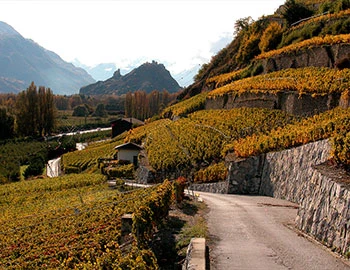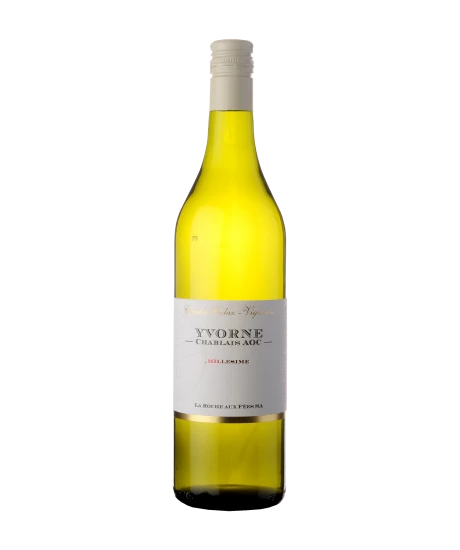Yvorne Ligne Prestige 2023
Yvorne Ligne Prestige 2023
AOC Chablais, Charles Rolaz (La Roche aux Fées SA), 375 ml

Description
The Yvorne presents itself fruity, open and floral on the nose. On the palate, it seduces with a juicy, creamy melt. It shows a yellow-fruity aroma reminiscent of quince, pears and vanilla. Spicy and mineral notes accompany the inviting fruit. This Chasselas finishes with a pleasant tartness that makes it a versatile food companion.
Attributes
| Grape variety: | Chasselas |
| Producer: | Charles Rolaz |
| Origin: | Switzerland / Waadt / Chablais |
| Other vintages: | 2024 |
| Ripening potential: | 1 to 4 years |
| Drinking temperature: | 10 to 12 °C |
| Food Pairing: | Apéro pastries, Fresh water fish with cream sauce, Cheese board |
| Vinification: | pressed carefully and immediately, fermentation in steel tank, fermentation at low temperatures |
| Harvest: | hand-picking, strict selection |
| Maturation: | in steel tank |
| Maturation duration: | 6 months |
| Volume: | 12.5 % |
| Note: | Contains sulphites |
Chasselas
Swiss pride
From cheerful drinking wine to the classy grand cru: the Chasselas is, with good reason, the flagship of Switzerland. It is extremely multifaceted. A young, apple and pear fruit specimen turns raclette into a feast. And a mature plant from the steep slopes of Lake Geneva, for instance from Lavaux, perfectly accompanies fish and seafood with its nut and flint notes. In its stronghold, the canton of Vaud, the Chasselas was once called Fendant. It has been known there for over 500 years. But at the beginning of the 20th century, vintners renamed it Chasselas, and from then on wrote the communities of origin on the label. Meanwhile, the grapes gathered such a reputation in neighbouring Valais as Fendant that most people today believe the name was invented there. The difference between the regions is that in Vaud the terroir expression of Chasselas is particularly noticeable. In Valais, conversely, the warm weather allows particularly round, fruity wines to develop. The Chasselas from Neuchâtel is not to be forgotten. A specialty there is the non-filtré, an unfiltered wine which is enjoyed in January as an early harbinger of spring.
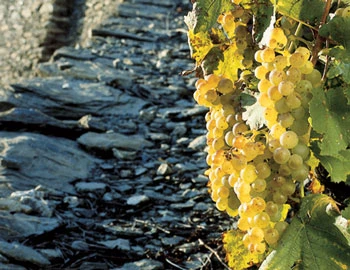
Chablais
Chablais: between lake and valley
The easternmost wine region of Vaud comprises approximately 590 of the canton’s 3,800 hectares. Although relatively small, the diversity of varieties and wine styles is exceedingly large. Besides the main variety of Chasselas, which presents its full charm here, the mostly red wines are also splendid. Pinot Noir selections present a thoroughly Burgundian dimension. But for several years, exquisite specialties have also been pressed from varieties like Merlot and Syrah.
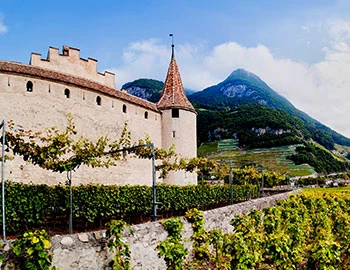
Waadt
Vaud: stronghold of the Chasselas
Vintners of Vaud have almost stubbornly maintained their loyalty to their preferred variety, Chasselas. This is now paying off, as white wines with moderate alcohol content are experiencing a renaissance. And vintners today interpret the lightness of Chasselas in their own individual ways. Over 100 chateaux produce wine here. By contrast, the wine villages fascinate with rural charm. It is these contrasts that make this winegrowing canton an exciting destination for wine tourism.
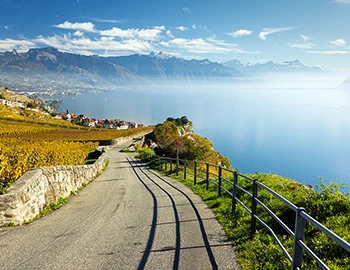
Switzerland
Switzerland – A small country with enormous diversity
Switzerland is famous for its banks, watches, and cheese, but not necessarily for its wine. The Swiss didn't invent wine, but they have been extremely open and curious to it. Wine culture arrived in what is now modern Switzerland via several routes: from Marseilles to Lake Geneva and the Lower Valais region; from the Aosta Valley through the Great St. Bernard Pass to the rest of Valais; from the Rhone through Burgundy, across the Jura Mountains to Lake Constance; and from Lombardy to Ticino, and then on to Grisons.
